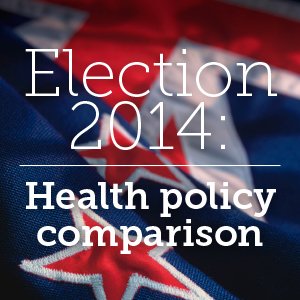With Election 2014 fast approaching, Nursing Review brings together all the parties’ health policy in one place for you to peruse before you vote.
 Our election health policy at a glance (see document below) is a summary of the publicly released policies and announcements made up to September 1 by the nine political parties with the potential to have one MP or more in the next parliament.
Our election health policy at a glance (see document below) is a summary of the publicly released policies and announcements made up to September 1 by the nine political parties with the potential to have one MP or more in the next parliament.
As always, the election policies tend to be more generic and less specific the further a political party is away from controlling the Treasury benches.
Many of the parties see free GP visits for children as a vote winner, with National starting the ball rolling with its Budget announcement for free doctor visits and prescriptions to children under 13. This has been backed by most other parties, and it has been extended to pregnant women and the over 65s by Labour and increased to children under 18 by the Greens and Māori party. Interestingly, only the Māori party talks about free healthcare rather than free GP visits. None of the parties mentioned free nursing care.
Aged care was a late entry into the policy arena, with Labour proposing the quick establishment of an Aged Care Working Group to advise on timeframe and funding for a range of issues, including pay parity for aged care nurses and caregivers. National followed by announcing a 5 per cent increase in rest home subsidies from October 1 ($10m a year) and some dementia funding. The Greens are calling for The Ageing In Place Report 2012 and the Human Rights Commission report on Aged Care 2012 recommendations to be implemented. Many of the minor parties are also talking about pay parity for those working in residential aged care.
Public health commitments vary widely, but many support moves to meet the goal of being Smokefree by 2025. A number have policies on improving access to oral health care and taking stands on marketing unhealthy food to children, but only a few are proposing taxes on sugary drinks or banning alcohol advertising.
The word nurse is not frequently seen in the parties’ health policy, but where it has been used specifically, the policies have been grouped together for you to read. New graduate nurse employment is an issue that has prompted a lot of concern in the sector but only a few parties have put the issue into written policy or action. At the time of gathering signatures for the 8000-strong NZNO petition that called for the government to fund nurse entry to practice (NETP) places for all graduate nurses, Health Minister Tony Ryall announced an extension of subsidised new graduate places from the current 1100 to 1300 and to provide 25 graduate nurse scholarships for high-needs general practices.
Labour’s election policy calls for an “enhanced funding pathway” for placement of new graduate nurses within DHBs. At the recent College of Primary Health Care Nurses conference political panel – attended by Labour, the Greens and New Zealand First (National declined the invitation) – all party health spokespeople were keen to see 100 per cent employment of new graduate nurses but were less clear on how this was to be funded or achieved at a time of very low nurse turnover and tight district health board budgets.
Only National, Labour, and the Greens have offered costings for their major health policies and provided a budget/alternative budget. We have given a very brief summary of each party’s financial platform (and provided links to their fuller financial policy) so you as voters can scrutinise how parties propose to pay for their policies. Nursing Review has also included some policy on some socio-economic factors that can impact on health and wellbeing, such as housing, family support, and the minimum wage.
Read on to find out more about policies on offer, including who is proposing sabbaticals for health professionals and who wants all New Zealanders to own and control their own electronic health record.
(Click on image to open PDF)














